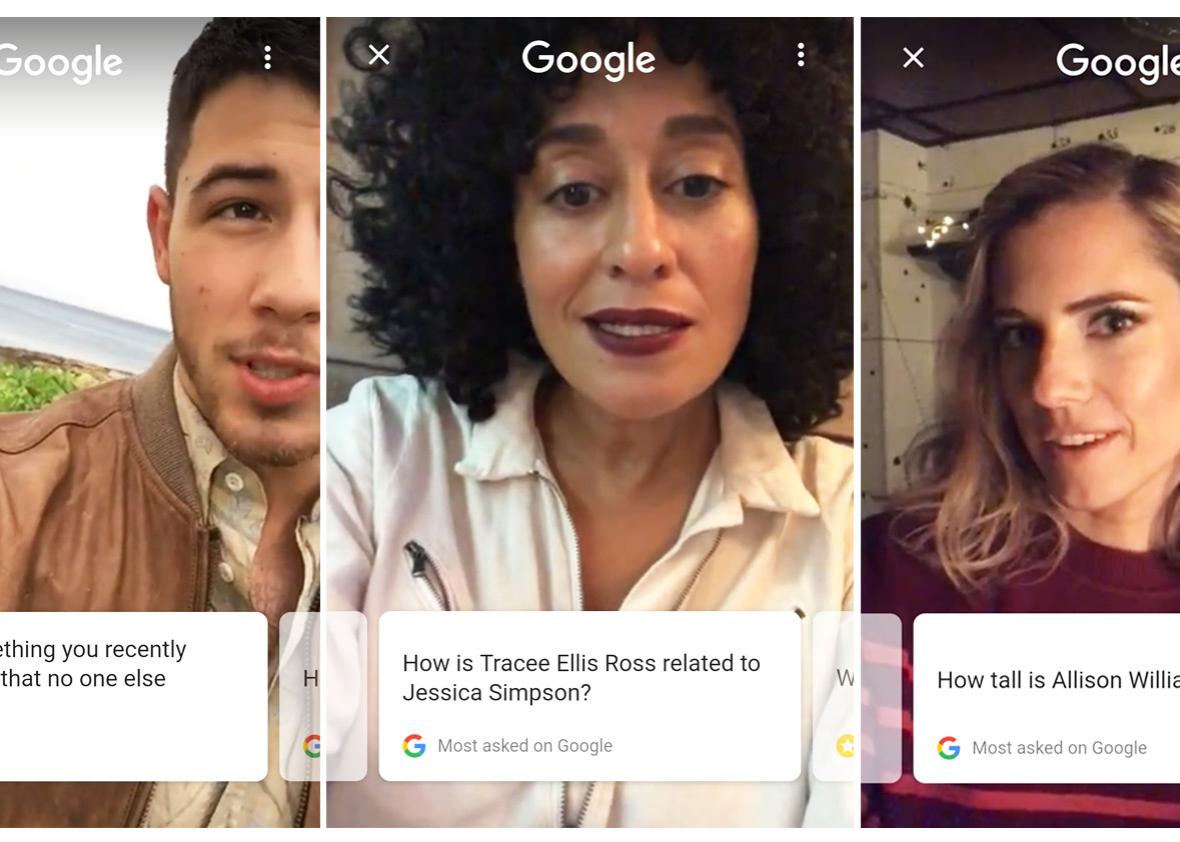I’m having a little trouble understanding a new search feature Google launched this week. Its gist is that when you search on mobile for the answers to some supposedly common questions about celebrities, videos of those celebrities answering your questions will pop up. As Google put it on its blog, you’ll get information “directly from the source … in the form of selfie-style videos with a uniquely personal, authentic and delightful touch.” Directly from the source! Take that, fake news?
When I typed in one of the queries Google demonstrated in its post—“Can Tracee Ellis Ross sing?”, which is almost certainly not a question anyone has ever Googled before now—sure enough, up popped a video of Ellis Ross addressing that question. It may be true that people wonder if Ellis Ross is as talented a singer as her mother Diana, or even if she sings at all, but I very much doubt they phrase it “Can Tracee Ellis Ross sing?” when typing into a search engine. Everyone can sing, and whether someone sings well is subjective, so it’s not really a Google-able query. In any case, that answer led into more videos of Ellis Ross answering questions like, “How does Tracee Ellis Ross stay in shape?” and “How to dress like Tracee Ellis Ross?” Her answer to the second one: “Wear what makes your heart sing, and go to J.C. Penney and buy the Tracee Ellis Ross for J.C. Penney line.” In addition to that answer basically being an ad, again, these don’t seem like questions anyone would actually ask Google. Nor does, “Can Will Ferrell really play the drums?” or “What does Allison Williams like to eat?” or any number of the questions this feature includes.
Have you ever typed a celebrity’s name into Google before? Often the predictive text that comes up after celebrities’ names reads “height” or “feet” or “dating” or “gay” or “net worth”—this is what the people who use Google to research celebrities are really after, not style tips. But no celebrity is going to happily give Google a “selfie-style” video in which she shows off her feet or discloses her net worth. The celebrity questions I really want to know the answers to—What really happened between Beyoncé, Jay Z, and Solange on that elevator?—are exactly the ones celebrities would rather ignore.
Then there’s the unavoidable point that these videos actually make Google less useful. If you really want to know how Tracee Ellis Ross is related to Jessica Simpson, wouldn’t text be more useful than a “uniquely personal, authentic and delightful video” wherein it takes Ellis Ross several seconds—charming seconds, to be clear—to reason her way through the filial connection? I don’t know what circumstances might lead you to want to know how TER and Jessica Simpson are related, but time is money, and you probably want to know quick.
It’s also worth mentioning that celebrities aren’t always a reliable source of information about themselves. When Nick Jonas addresses, “How to style hair like Nick Jonas?” he says, “You get out of the shower, you go like this, and it’s done.” Nick, that tells me nothing! Similarly, when Ellis Ross takes on how she stays in shape, she gives a decent answer (mentioning eating well, sleeping well, and the Tracy Anderson method), but it’s probably not the real answer, which is that it’s part of her job to stay in shape in an unforgiving industry, so she makes sacrifices regular people don’t make and has access to resources like personal trainers and chefs that most people don’t. Or take a simple thing like height. Celebrities have an incentive to lie about their heights, as Starlee Kine proved with Mystery Show, so why should we believe their answers, even if they are “direct from the source”?
To be fair, the feature makes a distinction between “Most asked on Google” and questions the service frames as coming from fans or “trending,” so Google isn’t expecting us to actually believe that anyone is Googling what movie changed Mark Walhberg’s life, which is under the “Google Fan” category. (Several of the Mark Wahlberg videos double as promo for Daddy’s Home 2, so that’s nice.) But I remain baffled why a major corporation put time and money into making such a silly series of videos that is neither especially entertaining nor useful and arguably undermines the product it is adorning. Surely the answer is not that the company has more money than it knows what to do with and the geeks that work there wanted to hang out with celebrities? There’s the possibility that Google wanted to encourage people to search on mobile—not that there’s any indication people are not already doing that—and that it wanted people to think that searching on mobile is a fun, hip thing to do? I wish I could type into the search engine, “Why did Google make these dumb selfie-style search videos?” and Nick Jonas would pop up to answer, but alas, I’m stuck with his explanation of the new Jumanji movie.
